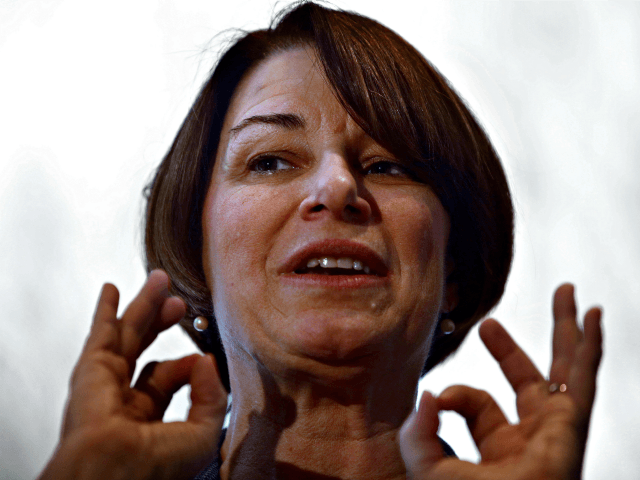Sen. Amy Klobuchar (D-MN), as a Minnesota county prosecutor in the early 2000s, refused to prosecute the police officer now at the center of the controversy surrounding the death of George Floyd.
Klobuchar, who served as the chief legal officer of Hennepin County, Minnesota, before ascending to the United States Senate, declined to charge Minneapolis police officer Derek Chauvin for his role in the shooting death of Wayne Reyes in October 2006.
Reyes allegedly “stabbed his girlfriend and a male friend,” before fleeing in his vehicle and setting off a chase by law enforcement, according to a report on police brutality from the Minneapolis-based Communities United Against Police Brutality.
Chauvin, who at the time had been on the Minneapolis police force since 1999, was one of six officers involved in the pursuit. When Reyes was eventually stopped, Chauvin and the other officers claimed he aimed a shotgun towards them in a threatening manner. Reyes’s alleged burnishing of the weapon resulted in all six officers opening fire and killing him.
The incident, which was reported by The Guardian on Thursday, elicited widespread concern among Minneapolis residents at the time of Reyes’s death for what was seen as too strong a use of force. As such, Klobuchar, who was running for the U.S. Senate at the time of the shooting, was pressured by the local black community in Minneapolis to prosecute the officers involved.
In the weeks following the shooting, however, Klobuchar declined to act on the matter. Instead, having won her Senate race, she spent the remaining three months of her tenure between November 2006 and January 2007 planning for her transition to Washington, DC. The case eventually went to a grand jury in 2008, which opted not to charge the officers with any wrongdoing for their conduct.
Chauvin would continue to serve on the Minneapolis police force for the next decade and a half. It would not, though, be his last brush with controversy. In 2011, Chauvin would be placed on temporary leave after he and four other officers shot a Native American man, who was later charged with felony second-degree assault. Overall, Chauvin would face at least ten civilian complaints throughout his tenure with the force. Three of those, which arose because of his use of “derogatory language” and “demeaning tone” towards suspects, would result in oral reprimands.
His career officially came to an end earlier this week when he was fired for his involvement in Floyd’s death. The firing came after a video went viral showing Chauvin kneeling on Floyd’s neck while attempting to arrest the man for alleged forgery. In the video, Floyd is heard pleading for help, claiming he cannot breathe, as Chauvin stands over him. Tou Thao, Chauvin’s partner who also has a record of police brutality complaints, is seen in the video refusing to intervene.
Since the video went viral, protests have arisen across Minnesota and other parts of the country from activists hoping to shine a light on what they see as the failures and inequities of the criminal justice system. Although most of the protests have been non-violent, several riots broke out in Minneapolis and neighboring Saint Paul on Wednesday and Thursday.
The attention drawn by both the protests and the riots has brought Klobuchar’s 2006 decision to not prosecute Chauvin back into the spotlight. Such scrutiny, however, comes at an inopportune moment for the senator, who leads the short-list to be former Vice President Joe Biden’s running mate this November.
Even though Klobuchar was always going to face criticism for the law and order image she cultivated as a county prosecutor, the current situation in Minnesota disqualifies her in the eyes of many black Democrats and activists. The sentiment was perhaps best summed up by Sunny Hostin during an episode of ABC’s The View on Wednesday.
“We’re seeing that black people in Minneapolis are arrested at nine times the rate of a white person for nonviolent offenses,” Hostin said. She added “that this is why the black community has said that Amy Klobuchar is a nonstarter for them, because … she declined to prosecute over two dozen cases involving police killings of unarmed people.”

COMMENTS
Please let us know if you're having issues with commenting.